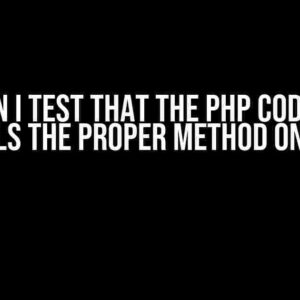Oh, the joy of working with Doctrine! You’ve spent hours crafting the perfect entity, meticulously setting up your relationships, and finally, you’re ready to put it all to the test. But, as you eagerly await the fruits of your labor, you’re met with a cryptic error message that leaves you scratching your head: “Object of class X could not be converted to string”.
- What’s Going On?
- Solution 1: Implementing the __toString() Magic Method
- Solution 2: Using Doctrine\Common\Collections\ArrayCollection Correctly
- Solution 3: Validating @ORM\Column Annotations
- Solution 4: Verifying @ORM\Entity Annotations
- Solution 5: Ensuring Consistent Getters and Setters
- Troubleshooting Tips
- Conclusion
What’s Going On?
In this article, we’ll delve into the world of Doctrine and unravel the mystery behind this enigmatic error. We’ll explore the possible causes, provide step-by-step solutions, and offer expert tips to help you overcome this hurdle and get back to coding.
The Usual Suspects
Before we dive into the solutions, let’s take a closer look at the common culprits behind this error:
__toString()magic method not implemented- Incorrect usage of
Doctrine\Common\Collections\ArrayCollection - Invalid or missing
@ORM\Columnannotations - Misconfigured or missing
@ORM\Entityannotations - Inconsistent or missing getters/setters for entity properties
Solution 1: Implementing the __toString() Magic Method
One of the most common causes of this error is the absence of the __toString() magic method in your entity class. This method allows Doctrine to convert your object to a string, which is essential for various operations, such as logging and debugging.
<?php
namespace App\Entity;
use Doctrine\ORM\Mapping as ORM;
/**
* @ORM\Entity
*/
class Book
{
/**
* @ORM\Id
* @ORM\GeneratedValue
* @ORM\Column(type="integer")
*/
private $id;
/**
* @ORM\Column(type="string")
*/
private $title;
/**
* @ORM\Column(type="string")
*/
private $author;
public function __toString()
{
return $this->getTitle() . ' by ' . $this->getAuthor();
}
// getters and setters
}
?>
In the example above, we’ve added the __toString() method to the Book entity, which returns a string representation of the object by concatenating the title and author properties.
Solution 2: Using Doctrine\Common\Collections\ArrayCollection Correctly
When working with collections, it’s essential to use Doctrine\Common\Collections\ArrayCollection correctly to avoid this error. Make sure to initialize the collection in your entity’s constructor and use the add() method to populate it.
<?php
namespace App\Entity;
use Doctrine\ORM\Mapping as ORM;
use Doctrine\Common\Collections\ArrayCollection;
/**
* @ORM\Entity
*/
class Book
{
/**
* @ORM\Id
* @ORM\GeneratedValue
* @ORM\Column(type="integer")
*/
private $id;
/**
* @ORM\OneToMany(targetEntity="App\Entity\Review", mappedBy="book")
*/
private $reviews;
public function __construct()
{
$this->reviews = new ArrayCollection();
}
public function addReview(Review $review)
{
$this->reviews->add($review);
$review->setBook($this);
}
// getters and setters
}
?>
In this example, we’ve initialized the reviews collection in the constructor and added a addReview() method to populate it.
Solution 3: Validating @ORM\Column Annotations
Doctrine relies heavily on annotations to map your PHP classes to database tables. Make sure to verify that your column annotations are correct and consistent.
<?php
namespace App\Entity;
use Doctrine\ORM\Mapping as ORM;
/**
* @ORM\Entity
*/
class Book
{
/**
* @ORM\Id
* @ORM\GeneratedValue
* @ORM\Column(type="integer")
*/
private $id;
/**
* @ORM\Column(type="string", length=255)
*/
private $title;
/**
* @ORM\Column(type="string", length=100)
*/
private $author;
// getters and setters
}
?>
In this example, we’ve added the correct column annotations for the title and author properties, specifying the data type and length.
Solution 4: Verifying @ORM\Entity Annotations
Ensure that your entity annotations are correctly configured, including the entity name, table name, and any necessary indexes or unique constraints.
<?php
namespace App\Entity;
use Doctrine\ORM\Mapping as ORM;
/**
* @ORM\Entity
* @ORM\Table(name="books")
*/
class Book
{
// properties and methods
}
?>
In this example, we’ve added the correct entity annotation, specifying the entity name and table name.
Solution 5: Ensuring Consistent Getters and Setters
Doctrine relies on getters and setters to access and manipulate your entity’s properties. Make sure to implement consistent and correctly named getters and setters for each property.
<?php
namespace App\Entity;
use Doctrine\ORM\Mapping as ORM;
/**
* @ORM\Entity
*/
class Book
{
/**
* @ORM\Column(type="string")
*/
private $title;
public function getTitle()
{
return $this->title;
}
public function setTitle($title)
{
$this->title = $title;
return $this;
}
// other getters and setters
}
?>
In this example, we’ve implemented the correct getter and setter methods for the title property.
Troubleshooting Tips
Still stuck? Here are some additional troubleshooting tips to help you overcome the “Object of class X could not be converted to string” error:
- Check your entity’s constructor to ensure that all necessary properties are initialized.
- Verify that your getters and setters are correctly named and implemented.
- Use Doctrine’s built-in debugging tools, such as
doctrine:orm:validate-schema, to identify any issues with your entity mapping. - Consult the Doctrine documentation and API reference for guidance on specific annotations and methods.
Conclusion
The “Object of class X could not be converted to string” error can be frustrating, but with these solutions and troubleshooting tips, you’ll be well-equipped to overcome this hurdle and get back to coding. Remember to implement the __toString() magic method, use Doctrine\Common\Collections\ArrayCollection correctly, validate your annotations, and ensure consistent getters and setters. Happy coding!
| Solution | Description |
|---|---|
| Implementing __toString() | Add the __toString() magic method to your entity class to allow Doctrine to convert your object to a string. |
| Using ArrayCollection correctly | Initialize the collection in your entity’s constructor and use the add() method to populate it. |
| Validating @ORM\Column annotations | Verify that your column annotations are correct and consistent, including data type and length. |
| Verifying @ORM\Entity annotations | Ensure that your entity annotations are correctly configured, including entity name, table name, and indexes or unique constraints. |
| Ensuring consistent getters and setters | Implement consistent and correctly named getters and setters for each property. |
Frequently Asked Question
Get answers to the most common questions about the “Doctrine: Object of class X could not be converted to string” error!
What is the “Doctrine: Object of class X could not be converted to string” error?
This error occurs when you’re trying to convert an object of class X to a string, but Doctrine can’t figure out how to do that magic trick! It usually happens when you’re trying to use an object as a string in a query, or when you’re trying to output an object as a string.
Why does Doctrine throw this error?
Doctrine throws this error because it’s trying to protect you from yourself! It’s a safety net to prevent you from doing something that doesn’t make sense, like trying to convert a complex object into a simple string. It’s like trying to fit a square peg into a round hole – it just won’t work!
How do I fix the “Doctrine: Object of class X could not be converted to string” error?
To fix this error, you need to make sure you’re not trying to use an object as a string. If you need to output an object as a string, you’ll need to create a custom method to convert the object into a string. For example, you could create a `__toString()` method in your class X to define how it should be converted to a string.
Can I use a Doctrine magic method to fix this error?
You’re in luck! Doctrine provides a magic method called `__toString()` that you can use to define how an object should be converted to a string. Just create this method in your class X, and Doctrine will use it to convert your object to a string when needed.
What if I’m still stuck with the “Doctrine: Object of class X could not be converted to string” error?
Don’t worry, friend! If you’re still stuck, try checking your code for any places where you’re using an object as a string. Make sure you’re not trying to output an object in a Twig template or a PHP string. If you’re still stuck, try searching for answers online or asking a friend for help. And remember, debugging is like being a detective – you need to follow the clues to find the solution!


